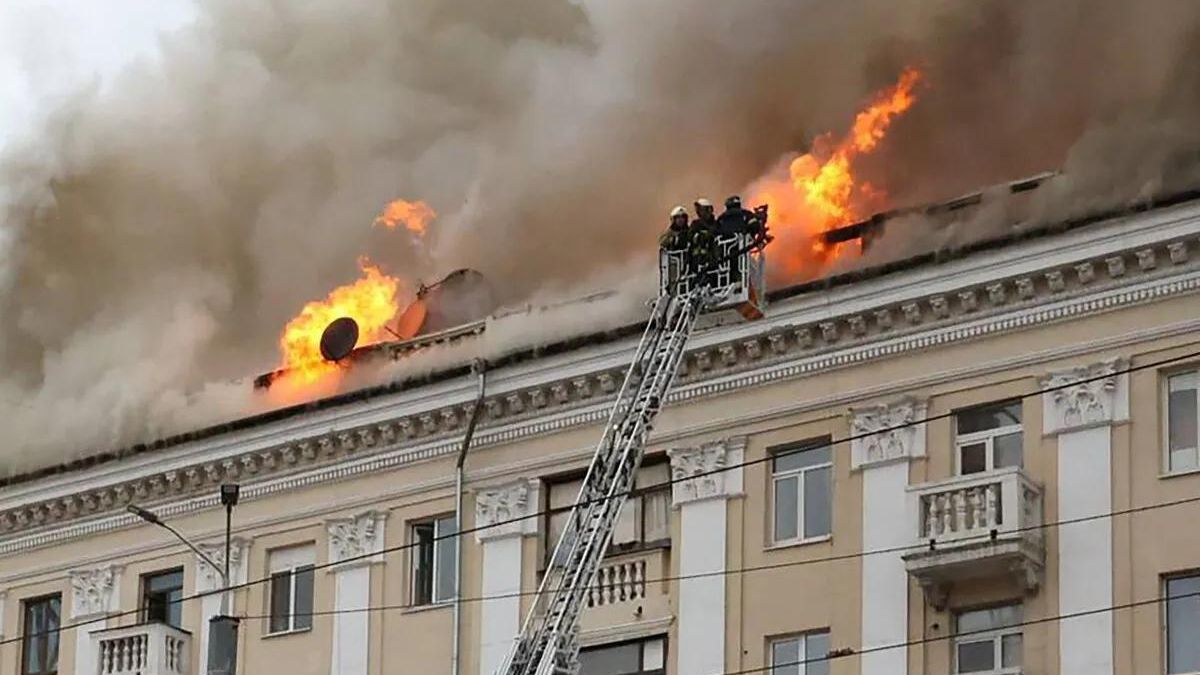On Saturday, Russian missiles bombarded power plants in central and western Ukraine, adding to the strain on the failing energy infrastructure at a time when the nation lacks air defences despite a significant improvement in US military assistance.
The air strike was the fourth significant aerial attack on the power grid since March 22. It was conducted using long-range missiles, including cruise missiles fired by Russian strategic bombers stationed in the Arctic Circle.
Despite this week’s breakthrough in US military cooperation, President Volodymyr Zelenskyy reiterated his requests to partners for additional defence missiles, particularly the Patriot system, and speedier supplies.
According to him, Russia is targeting facilities for the transportation of gas and power, particularly those crucial for the gas supply to the European Union. According to the air force commander, 21 of the 34 inbound missiles were intercepted by Ukrainian air defences.
Running water supplies were interrupted in Zelenskiy’s hometown of Kryvyi Rih following strikes on energy facilities in the central Dnipropetrovsk area, according to authorities.
Under a transit agreement with Russia’s Gazprom, which is scheduled to expire in December and which Ukraine says it does not plan to renew, Russia continues to deliver gas to the EU via Ukraine.
Impact Shorts
More ShortsAccording to DTEK, Ukraine’s largest private electricity company, the enemy ‘again massively shelled Ukrainian energy facilities.’ They also added that that four of its six thermal power plants had suffered damage overnight.
According to authorities, firefighters fought to put out flames at a number of energy plants in the western districts of Lviv and Ivano-Frankivsk, which are bordered by Romania and Poland, both NATO members.
Running water supplies were cut off in Kryvyi Rih, the hometown of President Volodymyr Zelenskiy, following raids on energy facilities in the central Dnipropetrovsk area, according to officials.
According to a statement from the air force commander, 21 of the 34 incoming missiles were intercepted by Ukrainian air defences.
As a security precaution to stop Russia from swiftly determining the extent of its strikes, none of the targets were named.
Zelenskyy said that the attack’s trajectory and design had been planned to make it as difficult to stop as possible. He also said that each downed rocket was a significant result.
Naftogaz, the state-owned oil and gas company of Ukraine, reported that although Russia had targeted its facilities, no one was harmed and shipments to Ukrainian customers and clients continued as usual.
Although it claims the Ukrainian electricity infrastructure is a valid military target, Russia, which launched a full-scale invasion of Ukraine in February 2022, denies targeting civilians. One energy worker was injured overnight, according to Ukrainian officials.
The hospital in Kharkiv, which has been under heavy bombardment in recent weeks, was hit by a missile overnight, wounding a lady and causing damage to the building, adjacent water pipelines and electricity lines, according to the regional governor of the city.
Overnight, a Ukrainian intelligence source told Reuters that Ukraine, which has been utilising long-range drones to try to retake Russia, targeted the Ilsky and Slavyansk oil refineries in the Krasnodar area of Russia.
According to the source, the SBU security service’s drone attack resulted in flames at the locations. According to the source, there was also an attack on Russia’s Kushchevsk military airstrip in the southern area.
An official in charge of the plant told the Russian state news agency TASS that the attack had damaged the Slavyansk oil refinery, forcing it to halt part of its operations.
Rolling blackouts
According to authorities, the Russian strikes have caused Ukraine to lose 80% of its thermal power generation and 35% of its hydroelectric capacity.
Even while nuclear power provides the majority of the energy system, experts warn that the loss of that capacity, which balances the grid and might become problematic as usage increases later this year, could have serious consequences.
In various areas, rolling blackouts have been implemented, but the full effect of the assaults has not been felt because of the mild weather, which lowers consumption, which peaks in the winter and the height of the summer.
For the time being, there were no scheduled blackouts in the Lviv area; nonetheless, the governor asked people to use less power, particularly in the evening when demand is at its highest. He said that the attack on Saturday had destroyed the two vital pieces of energy infrastructure in the regions of Chervonohrad and Stryi.
Zelenskyy demanded that Kyiv’s partners take strong action, expedite delivery of air defence supplies, and increase their quantity.
This week, the United States overcame a six-month legislative impasse that resulted in Kyiv’s armament stockpiling by approving a substantial assistance package for the country.
On Friday, the Pentagon announced that it will purchase $6 billion worth of additional weaponry for Ukraine, including Patriot air defence system interceptors.
During his visit to Lviv on Saturday, Australian Defence Minister Richard Marles revealed a $100 million military aid package that included drones and short-range air defence, with air-to-ground precision bombs to be sent separately.
)